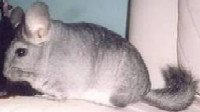Calcium (Ca) en phosphor (P) are needed in a ratio of 1:1 and 2:1. A imbalance of Ca and P can lead to weakened bones and cramps. This mainly occurs in young, growing animals, or pregnant ones.
Sterilised bone meal is a good source of Ca and P. the minerals occur in the right ratio. The sterilised bone meal can be give to the chinchilla (half a tea spoon, twice a week). The Ca-need depends on the status of the animal: during the lactation period, the Ca-need is twice as high. When the female suckles and is pregnant at the same time, the need will be higher still.
The Ca need in % of the dry substance is during growth 0,4 %, for maintenance 0,3 %, during pregnancy 0,4 % and during lactation 0,6 %.
The diet of pregnant females or breast feeding females can be completed with 30 ml skimmed milk (2 spoons) a day. It may be given from ten days before the animal will give birth and during the lactation period. full-cream milk is too fatty and contains too many calories.
Nursing females may get a complaint comparable to hypogalactia in cows, called tympanites. Hypogalactia is caused by a shortage in calcium and usually occurs 2-3 weeks after the female has given birth. Symptoms are paralysed hindquarters and disruption of the gastrointestinal tract. The complaint can be treated by the vet but with the right feed, it can be prevented.
Vitamin D, Ca and P in Chinchilla feed
21mei2008
Vitamin D, calcium and phosphor are important substances for the formation of bone and teeth. Vitamin D is created when the skin comes in contact with sunlight. It is also added to the feed.
